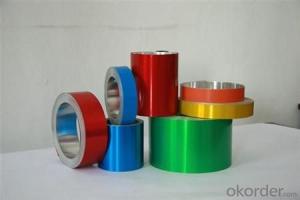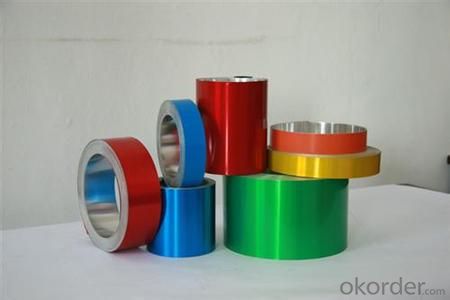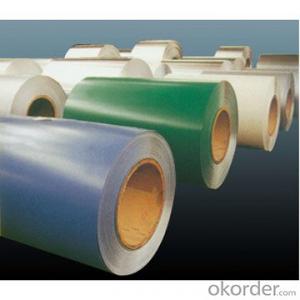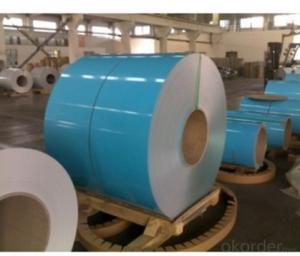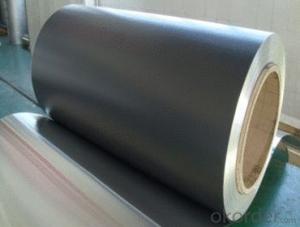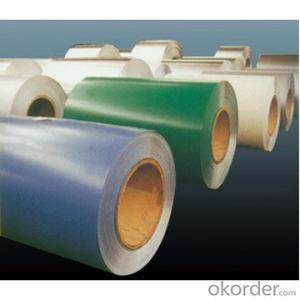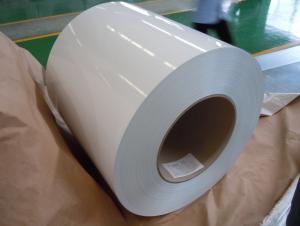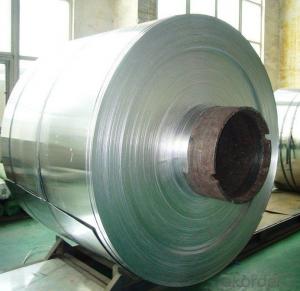5052 Aluminum Coil Wholesale - Aluminium Pre-Painted PVDF Hot Demanded Coil
- Loading Port:
- Shanghai
- Payment Terms:
- TT OR LC
- Min Order Qty:
- 8 m.t.
- Supply Capability:
- 2000 m.t./month
OKorder Service Pledge
OKorder Financial Service
You Might Also Like
Specification
Structure of Aluminium Pre-painted PVDF Hot Demanded Coil Description:
Coated aluminum coil/sheet are of a wide range of colors, which gives wonderful appearance no matter in residential and commercial constructions of great exhibition centers.
The coated aluminum coil/sheet have been widely used in the fields of construction and decoration( garage doors, ceiling etc.), electronic appliances, lighting decoration, air-condition air pipes, sandwich panels and drainages etc.
Main Features of the Aluminium Pre-painted PVDF Hot Demanded Coil:
1) High flexibility
2) Impact resistance
3) Excellent weather-proof durability
4) Anti-ultraviolet
5) High erosion resist
Images of the Aluminium Pre-painted PVDF Hot Demanded Coil:
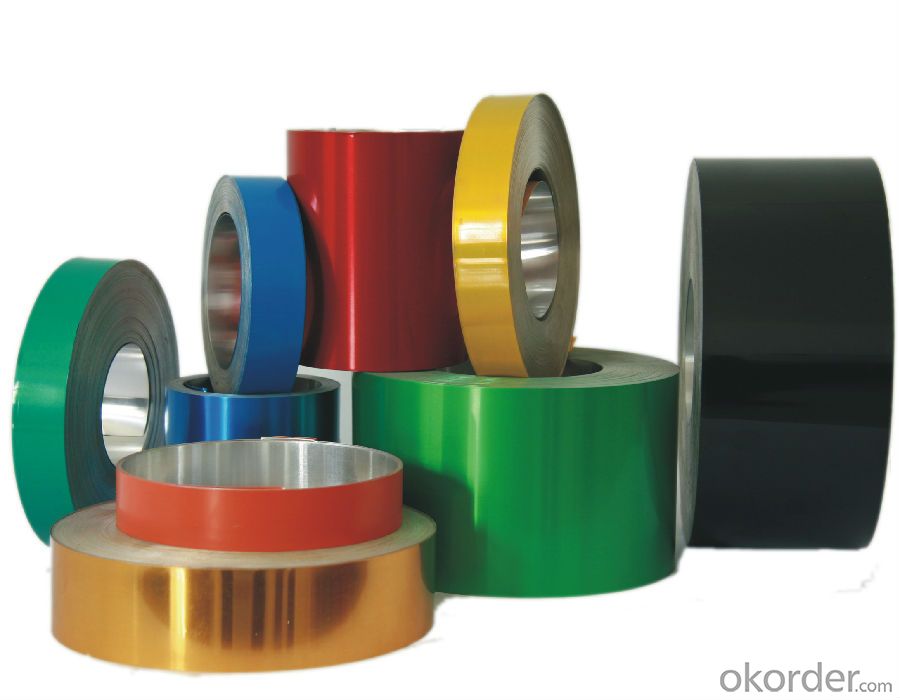
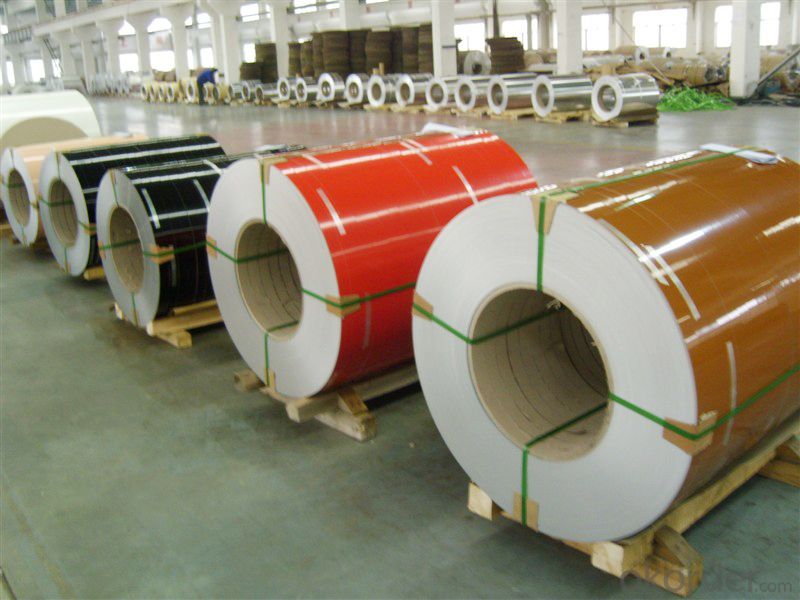
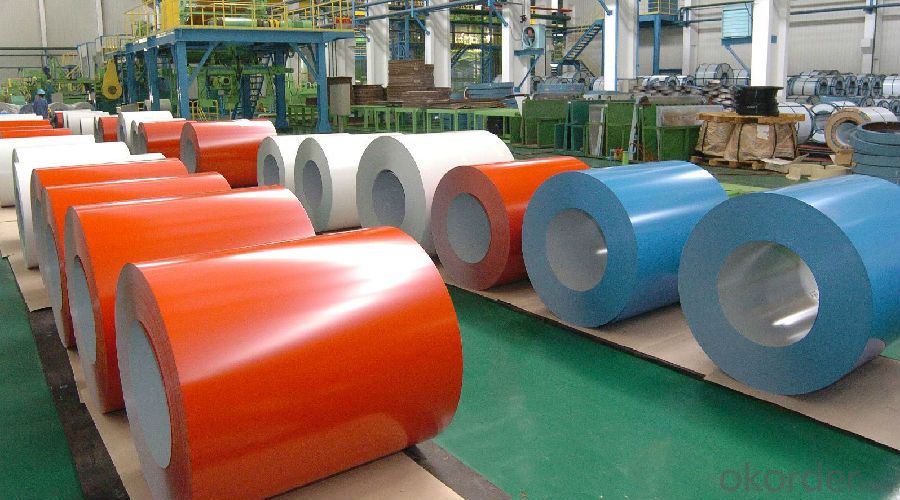
Aluminium Pre-painted PVDF Hot Demanded Coil Specification:
Alloy | A1100,A3003,A1050,A8011 etc |
Temper | H16,H18,H24 |
Thickness | From 0.024mm to 1.2mm |
Width | Standard width:1240mm |
Special width:1300mm,1520mm,1570mm,1595mm | |
Diameter | Standard dia:1200mm |
Interior dia:150mm,405mm,505mm | |
Weight | 2.5 T/coil,3.0 T/coil |
Coating | PE, PVDF, AC |
Surface | Embossed, mill finish, coated |
Color | AS to code RAL |
Gloss | 10-90%(EN ISO-2813:1994) |
Coating Thickness | PE: more than 18 micron |
PVDF: more than 25 micron | |
Coating Hardness (pencil resistance) | More than 2h |
Coating adhesion | 5J(EN ISO-2409:1994) |
Impact Resistance | No peeling or cracking(50 kg/cm,ASTMD-2794:1993) |
Flexibility (T-bend) | 2T |
MEK resistance | More than 100 |
FAQ Aluminium Pre-painted PVDF Hot Demanded Coil:
a.What is monthly capacity
---CNBM is one stated own company and our monthly capacity is about 2000tons.
b. Now which countries do you export your goods?
---Now we export to South East Asia,Africa, North America,South America ect.
- Q: What unique considerations or precautions need to be taken when handling aluminum coils?
- <p>When handling aluminum coils, there are several special requirements to consider. First, it's crucial to handle the coils carefully to avoid denting or scratching the surface, which can affect their quality and value. Secondly, due to aluminum's lightweight and high strength, specialized equipment like slitters and rewinders may be necessary to process the coils. Additionally, it's important to store aluminum coils in a dry environment to prevent corrosion. Proper ventilation is also required to avoid condensation, which can lead to oxidation. Finally, safety measures such as wearing protective gear and following material handling guidelines are essential to prevent accidents and injuries.</p>
- Q: Can aluminum coils be used for seamless gutters?
- Yes, aluminum coils can be used for seamless gutters. Aluminum is a popular choice for seamless gutter installations due to its durability, lightweight nature, and resistance to corrosion. The coils can be easily shaped and formed to create a seamless gutter system that effectively directs rainwater away from the building.
- Q: What are the recognized standards that dictate the quality of aluminum coil?
- <p>Yes, there are several standards that define the quality of aluminum coil. These include ASTM B209, which specifies requirements for aluminum and aluminum alloy flat sheet, coil, and plate for general usage. ASTM B210 covers aluminum and aluminum alloy sheet and plate for heat-treating. Additionally, EN 485 is a European standard that specifies the requirements for aluminum and aluminum alloy cold-rolled sheets, strips, and plates. These standards outline dimensions, chemical composition, mechanical properties, and other quality aspects to ensure the material meets industry requirements.</p>
- Q: Are aluminum coils suitable for air conditioning systems?
- Yes, aluminum coils are suitable for air conditioning systems. Aluminum coils are commonly used in air conditioning systems due to their many advantages. Firstly, aluminum is a lightweight material, making it easier to handle and transport during installation. This also reduces the overall weight of the unit, making it more energy-efficient. Furthermore, aluminum coils have excellent heat transfer properties, allowing for efficient cooling of the air. They provide enhanced thermal conductivity, which helps in transferring heat quickly and effectively. This results in better cooling performance and improved energy efficiency, reducing electricity consumption and saving costs in the long run. Aluminum coils also offer superior corrosion resistance compared to other materials like copper. This is important in air conditioning systems, as they are exposed to moisture and humidity. Aluminum coils can withstand these conditions without corroding or deteriorating, ensuring longer lifespan and reliable performance. Another advantage of aluminum coils is their affordability. Aluminum is a cost-effective material, making it a popular choice for air conditioning manufacturers. This affordability can translate to lower costs for consumers, making air conditioning systems more accessible and affordable. In conclusion, aluminum coils are suitable for air conditioning systems due to their lightweight, excellent heat transfer properties, corrosion resistance, and affordability. They provide efficient cooling, durability, and cost-effectiveness, making them a preferred choice for air conditioning units.
- Q: How are aluminum coils tested for quality?
- Aluminum coils are tested for quality using a variety of methods to ensure they meet the required standards. One of the commonly used tests is the visual inspection, where trained personnel examine the coils for any visual defects such as scratches, dents, or surface imperfections. Another important test is the dimensional inspection, which involves measuring the thickness, width, and length of the coils using precision instruments. This ensures that the coils are manufactured within the specified tolerances. Additionally, mechanical tests are conducted to assess the strength and durability of the aluminum coils. These tests include tensile and yield strength tests, which measure the maximum load a coil can withstand before breaking or deforming. Bend tests are also performed to evaluate the flexibility and resistance to cracking. Furthermore, chemical composition analysis is conducted to verify the purity and consistency of the aluminum material. This is typically done using spectroscopy techniques, such as atomic absorption or emission spectroscopy, to determine the exact elemental composition of the coils. Surface coating tests are also carried out to assess the quality of any protective or decorative coatings applied to the aluminum coils. These tests include adhesion testing, corrosion resistance testing, and color consistency evaluation. In addition to these traditional tests, advanced non-destructive testing methods are employed to detect any internal defects or flaws in the coils. Techniques like ultrasonic testing, eddy current testing, or X-ray inspection are used to identify any hidden defects without damaging the material. Overall, a combination of visual, dimensional, mechanical, chemical, and non-destructive tests ensures that aluminum coils meet the required quality standards before they are used in various applications such as construction, automotive, or electronics industries.
- Q: Can aluminum coils be used in solar energy systems?
- Certainly, solar energy systems can utilize aluminum coils. Aluminum is widely employed in the fabrication of solar panels and solar energy systems owing to its remarkable qualities. Lightweight, durable, and possessing excellent thermal conductivity, aluminum coils are perfect for dispersing heat away from solar cells. Moreover, aluminum's resistance to corrosion is essential for outdoor deployments, where solar panels face diverse weather conditions. By incorporating aluminum coils into solar energy systems, the efficiency and lifespan of the panels are enhanced, thus augmenting the efficacy and sustainability of solar energy generation.
- Q: Are there any restrictions on the coil thickness of aluminum coils?
- Yes, there are typically restrictions on the coil thickness of aluminum coils. The specific restrictions may vary depending on the intended application and industry standards. Generally, the thickness of aluminum coils is limited by the capabilities of the manufacturing equipment and the desired final product. Thinner coils are often preferred for applications that require flexibility, such as in the manufacturing of foils or flexible packaging materials. On the other hand, thicker coils are commonly used in industries like construction or automotive, where strength and durability are important factors. Additionally, the thickness of aluminum coils may be restricted by the availability and cost of raw materials. It is important for manufacturers to adhere to these restrictions to ensure the quality and performance of the final product.
- Q: What is the maximum operating temperature for aluminum coils?
- The specific grade of aluminum used typically determines the maximum operating temperature for aluminum coils. Generally, aluminum has a high melting point of approximately 660 degrees Celsius (1220 degrees Fahrenheit), allowing it to endure high temperatures without melting or distorting. For common grades of aluminum, the maximum operating temperature usually ranges from 200 to 300 degrees Celsius (392 to 572 degrees Fahrenheit). However, it is important to consider factors like coil thickness and the intended application, as these can affect the temperature range. In instances where higher temperatures are anticipated, it is advisable to employ aluminum alloys specifically engineered to withstand such conditions. Aluminum alloy 6061, for example, can tolerate maximum operating temperatures of up to 400 degrees Celsius (752 degrees Fahrenheit) or even higher. To guarantee safe operation within temperature limits, it is always recommended to consult the manufacturer's specifications and guidelines for the specific aluminum coils being utilized.
- Q: Are aluminum coils suitable for heat exchanger fins?
- Yes, aluminum coils are suitable for heat exchanger fins. Aluminum has excellent thermal conductivity, lightweight properties, and corrosion resistance, making it an ideal choice for heat transfer applications. Additionally, aluminum coils can be easily formed into various shapes and sizes, allowing for efficient heat exchange in heat exchangers.
- Q: What is the typical conductivity of aluminum coils?
- The typical conductivity of aluminum coils is relatively high, with values ranging from 34 to 38 million Siemens per meter (MS/m) at room temperature. Aluminum is known for its excellent electrical conductivity, which is why it is widely used in various electrical applications, including power transmission lines, electrical conductors, and coils. This high conductivity allows for efficient and effective flow of electric current through aluminum coils, making them suitable for conducting electricity in a reliable and efficient manner.
Send your message to us
5052 Aluminum Coil Wholesale - Aluminium Pre-Painted PVDF Hot Demanded Coil
- Loading Port:
- Shanghai
- Payment Terms:
- TT OR LC
- Min Order Qty:
- 8 m.t.
- Supply Capability:
- 2000 m.t./month
OKorder Service Pledge
OKorder Financial Service
Similar products
Hot products
Hot Searches
Related keywords
